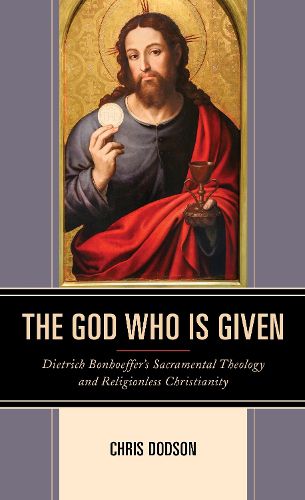Readings Newsletter
Become a Readings Member to make your shopping experience even easier.
Sign in or sign up for free!
You’re not far away from qualifying for FREE standard shipping within Australia
You’ve qualified for FREE standard shipping within Australia
The cart is loading…






Dietrich Bonhoeffer’s notions of religionless Christianity have provoked a great deal of theological inquiry, much of which has hindered evangelical reception of Bonhoeffer’s work. By setting religionless Christianity in the context of Bonhoeffer’s Lutheran sacramental theology, Chris Dodson furthers Bonhoeffer’s belief that receiving the God given in the sacraments both resists Christians’ proclivity towards religious, self-serving ends and draws Christians into a life of robust faith and love. Receiving Christ in baptism, the Eucharist, and confession serves to instill, sustain, locate, and vitalize the form of life that Bonhoeffer calls religionless. The church and its core practices are not abandoned in Bonhoeffer’s prison letters; they are reengaged with a more proper disposition: faithful love of God and neighbor. In this way, common evangelical skepticisms about Bonhoeffer’s later theology can be assuaged. Bonhoeffer’s theology, rightly construed, provokes evangelicals, and particularly American evangelicals, to reconsider and restructure their worship along the lines of a religionless Christianity that promotes a deeper faith resulting from a more vigorous encounter with Christ as he gives himself over to his people.
$9.00 standard shipping within Australia
FREE standard shipping within Australia for orders over $100.00
Express & International shipping calculated at checkout
Dietrich Bonhoeffer’s notions of religionless Christianity have provoked a great deal of theological inquiry, much of which has hindered evangelical reception of Bonhoeffer’s work. By setting religionless Christianity in the context of Bonhoeffer’s Lutheran sacramental theology, Chris Dodson furthers Bonhoeffer’s belief that receiving the God given in the sacraments both resists Christians’ proclivity towards religious, self-serving ends and draws Christians into a life of robust faith and love. Receiving Christ in baptism, the Eucharist, and confession serves to instill, sustain, locate, and vitalize the form of life that Bonhoeffer calls religionless. The church and its core practices are not abandoned in Bonhoeffer’s prison letters; they are reengaged with a more proper disposition: faithful love of God and neighbor. In this way, common evangelical skepticisms about Bonhoeffer’s later theology can be assuaged. Bonhoeffer’s theology, rightly construed, provokes evangelicals, and particularly American evangelicals, to reconsider and restructure their worship along the lines of a religionless Christianity that promotes a deeper faith resulting from a more vigorous encounter with Christ as he gives himself over to his people.